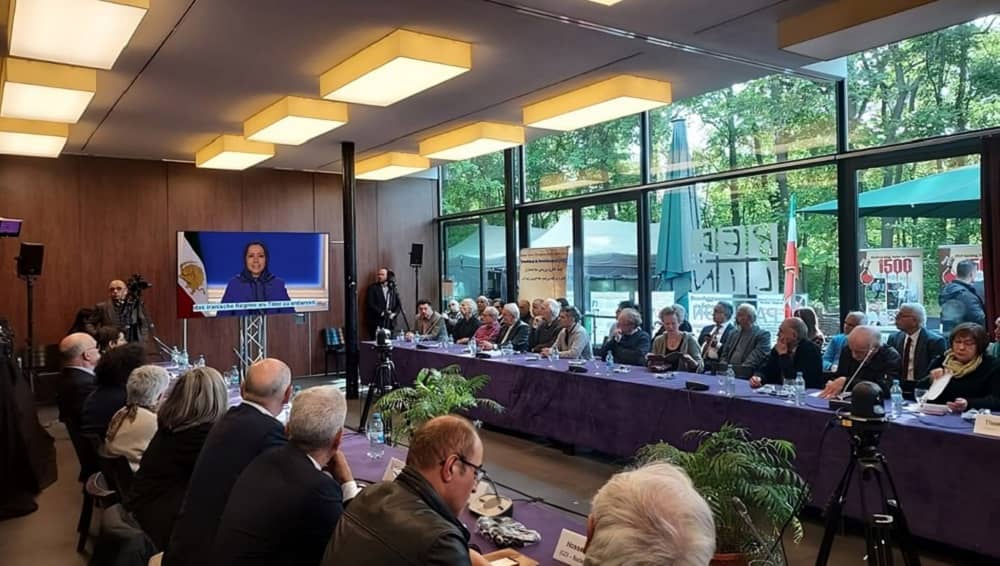
On April 25, Berlin hosted a pivotal conference titled “Solving the Iran Crisis: Advocating for Democratic Solutions,” which brought together German lawmakers, European dignitaries, and human rights activists to discuss the Iranian regime’s ongoing human rights abuses and regional destabilization activities.
The event featured notable speakers such as Professor Alejo Vidal-Quadras, former Vice President of the European Parliament and co-founder of the Committee on International Search for Justice. Vidal-Quadras, a survivor of Tehran’s terror tactics, shared his personal experiences with the regime’s demonization efforts against the Iranian Resistance. His testimony highlighted the oppressive nature of the regime and reinforced the call for a free, democratic Iran.
Message to a Conference Featuring German Federal MPs and Mr. Alejo Vidal-Quadras
The religious dictatorship ruling #Iran is at war with Iranian society and the international communityhttps://t.co/SYfCxWys4i pic.twitter.com/zoP3mjs0dn— Maryam Rajavi (@Maryam_Rajavi) April 26, 2024
Peter Altmaier, former Minister of Economics and senior advisor to Chancellor Angela Merkel, emphasized the Iranian community’s enthusiasm for democratic change. Altmaier praised the Ten-Point Plan proposed by Iranian opposition President-elect Maryam Rajavi of the National Council of Resistance of Iran (NCRI), which outlines a vision for a democratic Iran aligned with universal human rights principles. He also stressed the importance of international awareness and public support for Iranians’ struggle against regime oppression.
Mrs. Rajavi, in a video message, criticized the international community’s policy of appeasement towards the Iranian regime. She highlighted the increased repressive measures within Iran, including a surge in executions and the suppression of women, and called for decisive international action. Rajavi urged German lawmakers to recognize the Iranian Revolutionary Guard Corps (IRGC) as a terrorist entity and to view the Iranian regime as a threat to global peace under Chapter VII of the United Nations Charter.
On April 13, the regime had to put aside the mask of proxy groups and directly enter the war. It was proven that the main party to the war that started on October 7 is the Iranian regime.
Khamenei is the only party that benefits from the horrific killings and suffering of… pic.twitter.com/4vvrhvEWsm— Maryam Rajavi (@Maryam_Rajavi) April 26, 2024
German MP Carsten Müller echoed these sentiments, condemning the regime’s human rights violations and its attacks on Israel. Müller stressed the need for a concerted effort to hold the regime accountable, including the designation of the IRGC as a terrorist organization. He highlighted recent U.S. Congress resolutions supporting a free and democratic Iran as a significant international step.
The conference also served as a platform for other German MPs and human rights advocates to voice their support for the Iranian resistance. Christoph de Vries, Martin Patzelt, and Michael Meister detailed their respective experiences and commitments to the cause, stressing the urgency of addressing both the internal repression and external aggression perpetuated by Tehran.
The gathering in Berlin marks a critical juncture in the international dialogue on Iran, with participants advocating for a robust and unified response to the regime’s continued violations of human rights and international laws. The calls for action, including more stringent sanctions and diplomatic efforts, underscore a growing consensus on the need for significant changes within Iran, aimed at fostering a stable, democratic future for its people.

MEK Iran (follow us on Twitter and Facebook), Maryam Rajavi’s on her site, Twitter & Facebook, NCRI (Twitter & Facebook), and People’s Mojahedin Organization of Iran – MEK IRAN – YouTu







